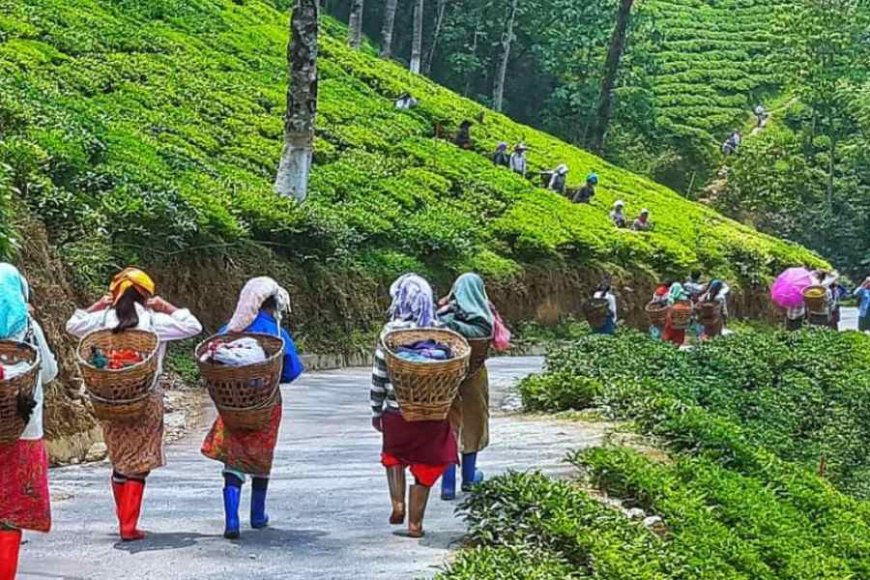Darjeeling's Exodus: The Journey to Israel for Better Livelihoods
Exploring the Challenges and Aspirations of Tea Garden Workers

Darjeeling: In the "champagne of tea," the queen of the hills, there are more shouts of support for Israel.
The proverb 'gold blooms on tea bushes,' I used to hear from my elders, inspired the previous generations to labor in tea gardens. Bikash Chhetri (name changed on request), a resident of Darjeeling's Soom tea plantation, stated, "Today, I have sold my family's gold necklaces and am heading to Israel to earn a decent living."
Bikash has enrolled in a one-month caregiving course at a facility on Delhi's Panchkuian Road. Basic Hebrew is also being taught to him. The majority of them end up working as senior caregivers in Israel.
But getting to Israel is not an inexpensive trip.
To get a job in Israel, an applicant needs to be prepared to pay brokers over Rs 16 lakh. The cost decreased from the initial sum of Rs 26 lakh due to the increased demand for labor brought on by the ongoing Gaza war.
"Even after selling cows and gold and asking for loans from family, I have only been able to obtain about Rs 6 lakh. The remaining funds will be contributed by the agents with a five percent interest rate that will be subtracted from my pay, according to Bikash.
The majority of those who are now in Israel, where wages are "quite lucrative," concur that agents make the most money.
In Israel, we receive anything from Rs. 1.2-2 lakh. A young Darjeeling resident named Pravesh (name changed per request) told me that a comparable job in Dubai pays about Rs 20,000 a month. Ramla is about an hour's drive from Tel Aviv, the capital.
When Pravesh, 29, decides to join any tea garden back home, they would welcome him with open arms.
Between 45 and 50 percent of workers miss work due to absences. Following the 104-day strike in 2017, the Darjeeling Tea Association's chief adviser, Sandeep Mukherjee, stated that the exodus from the Darjeeling gardens got severe.
Around 3 lakh people receive direct or indirect support from the 87 tea gardens in the Darjeeling Lok Sabha constituency, which are allowed to sell their output as "Darjeeling Tea" because to their 2003 Geographic Indicator (GI) designation. These tea gardens employ 70,000 people.
One of the main issues facing the sector recently has been a lack of labor. The union and employees place the blame on poor pay and highlight a broader tendency among young people to enter the hospitality sector and other less physically demanding but more fulfilling careers.
In the past, the Darjeeling gardens would finish around 26 rounds of plucking each year. The average now stands at 16–18 rounds, according to a tea grower. In 2023, the sector produced just 6.1 million kg of manufactured tea, compared to 14.5 million kg in the 1990s.
Graduate Pravesh stated that going back to work in the tea gardens was out of the question. Going back to the tea gardens is a strict no-no for the majority of young people my age. Most people choose to work in larger cities for greater pay, even if they are not in Israel, according to Pravesh.
An employee in a tea garden makes Rs 250 per day.
This is an inaccurate portrayal. The cash portion of the pay is limited to Rs 250. The compensation will be Rs 422 if additional fringe perks are taken into consideration, a planter stated.
The parliamentary standing committee on commerce recognized the "meagre wages being paid to tea workers of Darjeeling and other areas of north Bengal which is below the statutory threshold of minimum wages in the country" in a 2022 report that focused on Darjeeling Tea.
In Bengal, a 24-person advisory group on tea minimum wage was established in 2015. Despite holding eighteen meetings, the minimum pay for workers has not yet been decided.
The management, however, emphasizes that poor output, excessive absenteeism, and low price realization in both local and foreign markets are the main causes of the problem facing the Darjeeling sector, which has an annual turnover of about Rs 400–500 crore.
Darjeeling tea gardens are for sale, but no one is interested in purchasing them. Why would gardeners wish to sell their spaces? a planter stated.
Union officials claimed that since the management hasn't "invested back" in the garden by replanting, they should also bear some of the blame. It is anticipated that the declining state of the Darjeeling tea business would accelerate the migration.
But living away from home is not always simple. Due to the almost two- to three-year debt repayment term once in Israel, the workers are compelled to remain there even during times of violence.
For years, many parents are compelled to leave their kids with their grandparents in Darjeeling.
"I experienced gall bladder issues in 2020. Doctors urged me to go back to Darjeeling, but I declined," said Pravesh, who only made one trip back to the city after departing in 2018.
Pravesh related the story of a woman who fell ill and spent three months recovering in Darjeeling. "She paid an additional Rs 15 lakh to return to Israel after an additional four to five months, but regrettably, she became unwell once more. In the end, she lost almost Rs 30 lakh, according to Pravesh.
Bikash hopes to travel to Israel prior to the announcement of the Lok Sabha election results. "I'm hopeful that in two or three years, my luck will turn around. My spouse is in Israel as well. Additionally present is my brother-in-law, who just purchased land in Siliguri and is doing well financially, according to Bikash.





















































